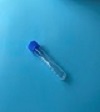
Purines and Pyrimidines Panel, Plasma-994
Test info
-
Evaluating patients with symptoms suspicious for disorders of purine and pyrimidine metabolism
-
Monitoring patients with disorders of purine and pyrimidine metabolism
-
Laboratory evaluation of primary and secondary hyperuricemias
-
Assessing tolerance for fluoropyrimidine drugs used in cancer treatment
-
Aiding in the diagnosis of individuals with suspected dihydropyrimidine dehydrogenase deficiency
The preferred test to rule-out inherited disorders of purine and pyrimidine metabolism is PUPYU / Purines and Pyrimidines Panel, Random, Urine.
This test does not evaluate succinyladenosine. If succinyladenosine analysis is needed, order PUPYU / Purines and Pyrimidines Panel, Random, Urine.
Additional confirmatory testing is required for follow-up of abnormal results.
Specimen
- Centrifuge specimen at 4° C.
- Transfer plasma to a Screw cap transfer vial/tube (Mayo T914) labelled as EDTA plasma
- Freeze
Patient's age is required.
Frozen (strict) - 90 days
Gross hemolysis
Gross lipemia
Gross icterus
Performance
Liquid Chromatography-Tandem Mass Spectrometry (LC-MS/MS)
Clinical and Interpretive info
All results reported as nmol/mL
|
Age range |
0-1 years |
>1-4 years |
5-18 years |
>18 years |
|
Uracil |
< or =2 |
< or =2 |
< or =2 |
< or =2 |
|
Thymine |
< or =2 |
< or =2 |
< or =2 |
< or =2 |
|
Adenine |
< or =3 |
< or =3 |
< or =3 |
< or =3 |
|
Hypoxanthine |
< or =35 |
< or =17 |
< or =15 |
< or =15 |
|
Xanthine |
< or =6 |
< or =6 |
< or =6 |
< or =3 |
|
Dihydroorotic |
< or =2 |
< or =2 |
< or =2 |
< or =2 |
|
Uric Acid |
100-450 |
150-500 |
150-500 |
150-500 |
|
Deoxythymidine |
< or =2 |
< or =2 |
< or =2 |
< or =2 |
|
Deoxyuridine |
< or =2 |
< or =2 |
< or =2 |
< or =2 |
|
Uridine |
< or =14 |
< or =9 |
< or =9 |
< or =9 |
|
Deoxyinosine |
< or =2 |
< or =2 |
< or =2 |
< or =2 |
|
Deoxyguanosine |
< or =2 |
< or =2 |
< or =2 |
< or =2 |
|
Inosine |
< or =2 |
< or =2 |
< or =2 |
< or =2 |
|
Guanosine |
< or =2 |
< or =2 |
< or =2 |
< or =2 |
|
Dihydrouracil |
< or =3 |
< or =3 |
< or =3 |
< or =3 |
|
Dihydrothymine |
< or =2 |
< or =2 |
< or =2 |
< or =2 |
|
N-carbamoyl- beta-alanine |
< or =2 |
< or =2 |
< or =2 |
< or =2 |
|
N-carbamoyl- beta-aminoisobutryic acid |
< or =2 |
< or =2 |
< or =2 |
< or =2 |
Additional confirmatory testing is required for follow-up of abnormal results.
Epilepsy: Unexplained Refractory and/or Familial Testing Algorithm
Purines (adenine, guanine, xanthine, hypoxanthine, uric acid) and pyrimidines (uracil, thymine, cytosine, orotic acid) are involved in all biological processes, providing the basis for storage, transcription, and translation of genetic information as RNA and DNA. Purines are required by all cells for growth and survival and play a role in signal transduction and translation. Purines and pyrimidines originate primarily from endogenous synthesis, with dietary sources contributing only a small amount. The end-product of purine metabolism is uric acid (2,6,8-trioxypurine), which must be excreted continuously to avoid toxic accumulation.
Disorders of purine and pyrimidine metabolism can involve all organ systems at any age. The diagnosis of the specific disorders of purine and pyrimidine metabolism is based upon the clinical presentation of the patient, determination of specific concentration patterns of purine and pyrimidine metabolites, and confirmatory enzyme assays and molecular genetic testing.
Over 35 inborn errors of purine and pyrimidine metabolism have been documented. Clinical features are dependent upon the specific disorder but represent a broad spectrum of clinical manifestations that may include immunodeficiency, developmental delay, nephropathy, and neurologic involvement. The most common disorder of purine metabolism is deficiency of hypoxanthine-guanine phosphoribosyl transferase (HPRT), which usually results in classic Lesch-Nyhan syndrome. Lesch-Nyhan syndrome is an X-linked disorder characterized by crystals in urine, neurologic impairment, mild to severe intellectual disability, development of self-injurious behavior, and uric acid nephropathy.
Treatments for Lesch-Nyhan syndrome include allopurinol, urine alkalinization and hydration for nephropathy, and supportive management of neurologic symptoms. For milder forms of HPRT deficiency, treatment that can mitigate the potentially devastating effects of these diseases are disorder dependent; therefore, early recognition through screening and subsequent confirmatory testing is highly desirable.
Dihydropyrimidine dehydrogenase (DPD) deficiency can result in a severe disorder in infancy involving seizures, intellectual disability, microcephaly, and hypertonia. In its mildest form, however, individuals with DPD deficiency may be asymptomatic but are at risk for life-threatening toxic reactions to a certain class of drugs used to treat cancer called fluoropyrimidines (eg, 5-fluorouracil and capecitabine). If individuals with DPD deficiency ingest this medication, they can develop fluoropyrimidine toxicity. This drug toxicity can result in inflammation of the gastrointestinal tract and associated symptoms, as well as abnormal blood counts including neutropenia and thrombocytopenia.

